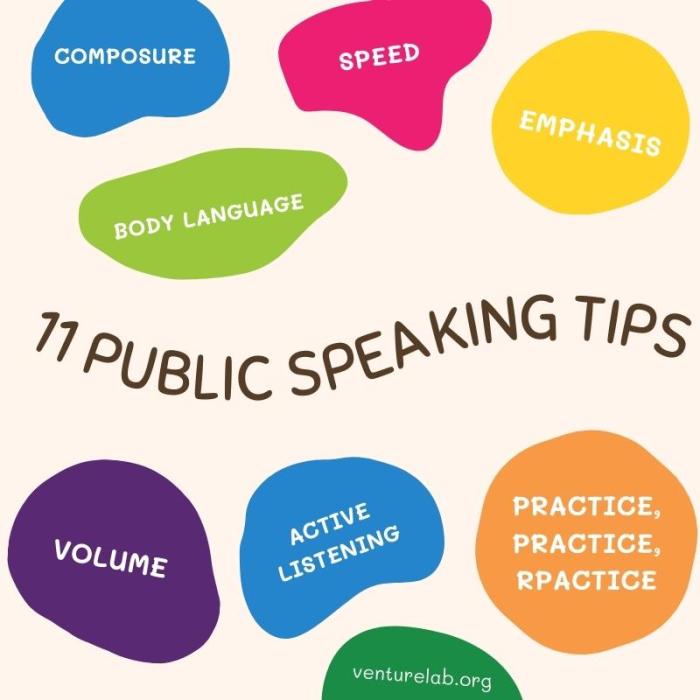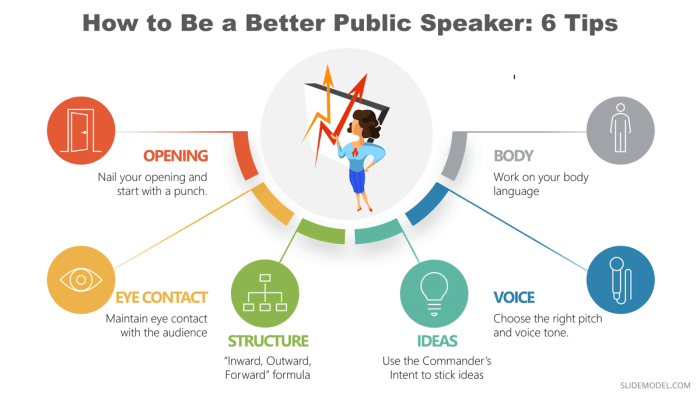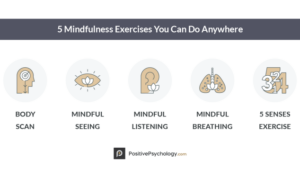Public Speaking Tips: Get ready to rock the stage with these killer tips that will take your speaking skills to the next level! Whether you’re a seasoned speaker or just starting out, this guide has got you covered.
From overcoming stage fright to captivating your audience with engaging storytelling, this comprehensive Artikel will help you become a public speaking superstar.
Introduction to Public Speaking

Public speaking is the art of communicating information to an audience in a clear and engaging manner. It is an essential skill in various aspects of life, including school presentations, job interviews, and even social gatherings. The ability to speak confidently and effectively in public can open up numerous opportunities and help individuals stand out from the crowd.
Importance of Public Speaking
- Enhances communication skills: Public speaking helps individuals articulate their thoughts and ideas clearly, improving overall communication skills.
- Builds confidence: By mastering public speaking, individuals can boost their self-confidence and overcome anxiety when speaking in front of others.
- Career advancement: Strong public speaking skills are highly valued in the workplace and can lead to career growth and advancement.
Examples of Situations Requiring Public Speaking
- Presenting a project in front of classmates or colleagues
- Delivering a speech at a wedding or special event
- Participating in a debate or panel discussion
Overcoming Stage Fright
Feeling nervous before speaking in public is totally normal, but for some, stage fright can be overwhelming. Understanding the reasons behind stage fright and having strategies to overcome it can make a huge difference in boosting confidence on stage.
Common Reasons for Stage Fright
- Fear of judgment from the audience
- Lack of preparation or knowledge on the topic
- Low self-confidence or self-esteem
- Past negative experiences with public speaking
Practical Tips to Overcome Stage Fright
- Practice deep breathing exercises to calm nerves
- Visualize a successful presentation beforehand
- Focus on the message you want to deliver, not on yourself
- Start with smaller speaking engagements to build confidence
Preparation to Reduce Anxiety
Preparation is key to reducing anxiety before speaking in public. By knowing your material inside and out, you’ll feel more confident and less likely to experience stage fright. Rehearse your speech multiple times, anticipate possible questions from the audience, and familiarize yourself with the speaking environment to help ease nerves on the big day.
Structuring Your Speech
When it comes to public speaking, having a well-structured speech is key to keeping your audience engaged and getting your message across effectively. A well-structured speech typically consists of three main components: the introduction, body, and conclusion.
The Components of a Well-Structured Speech
- Introduction: This is where you grab the attention of your audience and introduce the topic of your speech. It should set the tone for the rest of your presentation.
- Body: The body of your speech is where you provide the main content, arguments, or points that support your topic. Organize your points logically and clearly to ensure your audience can follow along easily.
- Conclusion: In the conclusion, you should summarize the main points of your speech and leave your audience with a memorable closing statement. This is your final chance to reinforce your message.
Tips on How to Organize Your Speech Effectively
- Start by outlining your main points and organizing them in a logical order.
- Consider using transitions to smoothly move from one point to the next.
- Use visual aids or examples to support your points and make your speech more engaging.
- Practice your speech multiple times to ensure you are comfortable with the flow and timing.
The Importance of Having a Clear Introduction, Body, and Conclusion in a Speech
A clear introduction helps to grab the audience’s attention and set the stage for what’s to come. The body of the speech provides the main content and supports your arguments, while the conclusion wraps everything up and leaves a lasting impression on your audience. Without these key components, your speech may feel disjointed and fail to leave a lasting impact.
Engaging the Audience
Engaging the audience is a crucial aspect of public speaking as it helps to keep them interested and attentive throughout your presentation. By using certain techniques, such as storytelling, anecdotes, and interactive elements, you can capture and maintain their attention effectively.
Using Storytelling or Anecdotes
Storytelling and anecdotes are powerful tools in public speaking as they help to make your message more relatable and memorable to the audience. By sharing personal stories or relevant anecdotes, you can create a connection with the listeners and draw them into your speech. This technique not only adds depth to your presentation but also helps to keep the audience engaged and interested in what you have to say.
- Start with a compelling story that relates to the main theme of your speech.
- Use descriptive language to paint a vivid picture in the minds of the audience.
- Keep your stories concise and to the point to maintain the audience’s interest.
- Use anecdotes to illustrate key points or concepts in a more engaging way.
Remember, people remember stories more than facts, so incorporating storytelling into your speech can make a lasting impact on your audience.
Interacting with the Audience
Interacting with the audience is another effective way to enhance engagement during your speech. By involving the listeners in your presentation, you can create a dynamic and interactive environment that keeps them actively participating and paying attention.
- Ask open-ended questions to encourage audience participation and engagement.
- Encourage audience members to share their thoughts or experiences related to the topic.
- Use eye contact and gestures to connect with individuals in the audience.
- Incorporate interactive elements, such as polls or quizzes, to make the presentation more engaging.
By interacting with the audience, you can create a more memorable and impactful speech that resonates with the listeners long after it’s over.
Body Language and Delivery: Public Speaking Tips

Body language plays a crucial role in effective communication, often conveying more than words alone. It includes gestures, eye contact, posture, vocal variety, and pacing, all of which can significantly impact how your message is received by the audience.
Using Gestures, Eye Contact, and Posture
- Use gestures to emphasize key points and add energy to your speech.
- Maintain eye contact with different audience members to create a connection and build rapport.
- Stand tall with good posture to appear confident and in control of the room.
Impact of Vocal Variety and Pacing, Public Speaking Tips
- Vary your tone, pitch, and volume to keep the audience engaged and emphasize important ideas.
- Adjust the pace of your speech to allow for moments of reflection and to build suspense.
- Pausing strategically can also help emphasize key points and allow the audience to digest information.
Handling Q&A Sessions
When it comes to handling Q&A sessions after a speech or presentation, it’s important to be prepared and stay composed. Here are some strategies to effectively manage questions from the audience and handle unexpected or challenging inquiries with confidence.
Strategies for Effective Q&A Management
- Capture the Question: Repeat or rephrase the question to ensure you understand it correctly and give yourself time to gather your thoughts.
- Stay Calm: Take a deep breath and maintain a calm demeanor, even if the question catches you off guard.
- Be Honest: If you don’t know the answer, admit it gracefully. Offer to follow up later with more information.
- Stay Positive: Keep a positive attitude and avoid getting defensive, even if the question is challenging.
Handling Unexpected or Challenging Questions
- Stay Focused: Don’t let a difficult question throw you off track. Take a moment to gather your thoughts before responding.
- Acknowledge the Question: Show respect for the audience member by acknowledging their question, even if it’s challenging.
- Redirect if Necessary: If a question is off-topic or not appropriate, politely redirect the conversation back to the main subject.
- Avoid Arguments: Even if you disagree with the question or find it confrontational, maintain a professional and respectful tone in your response.
Tips for Composed and Confident Responses
- Eye Contact: Make eye contact with the person asking the question to establish a connection and appear confident.
- Speak Clearly: Take your time to articulate your response clearly and concisely, avoiding rambling or rushing through your answer.
- Practice Active Listening: Show that you are actively listening to the question by nodding or paraphrasing key points before responding.
- Thank the Audience: Always thank the audience for their questions, regardless of how challenging they may be. It shows appreciation for their engagement.
Practice and Feedback
Practice makes perfect when it comes to honing your public speaking skills. It’s essential to put in the time and effort to improve your abilities in front of an audience. Additionally, receiving feedback from others can provide valuable insights on how to enhance your speaking style and delivery.
Different Ways to Practice
- Rehearsing in front of a mirror allows you to observe your body language and facial expressions, helping you make adjustments as needed.
- Recording yourself while practicing can give you a different perspective on your speech, allowing you to identify areas for improvement.
- Joining a public speaking club or group can provide a supportive environment where you can practice regularly and receive constructive feedback from peers.
Importance of Feedback
- Feedback from peers or mentors can offer valuable insights on your speaking style, delivery, and overall effectiveness.
- Constructive criticism can help you identify areas for improvement and make necessary adjustments to enhance your public speaking skills.
- Feedback can boost your confidence and motivation, encouraging you to continue working on your public speaking abilities.









